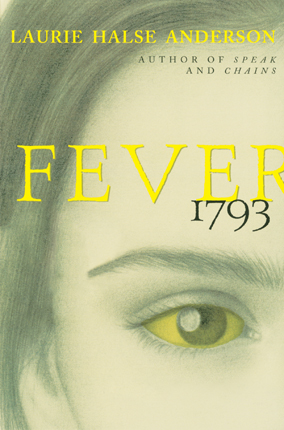| Fever, 1793 Author: Anderson, Laurie Halse | ||
| Price: $7.37 | ||
Summary:
In 1793, Matilda Cook learns about perseverance and self-reliance when she is forced to cope with the horrors of a yellow fever epidemic.
Audio Prevew:
| Accelerated Reader Information: Interest Level: UG Reading Level: 4.40 Points: 7.0 Quiz: 42961 | Reading Counts Information: Interest Level: 6-8 Reading Level: 7.60 Points: 13.0 Quiz: 22163 | |
Reviews:
Kirkus Reviews (06/15)
School Library Journal (+) (08/00)
Booklist (12/15/01)
The Bulletin of the Center for Children's Books (10/00)
The Hornbook (09/00)
Full Text Reviews:
Bulletin for the Center... - 10/01/2000 As yellow fever invades the young nation’s capital at Philadelphia, Mattie Cook and her family soon discover that their coffeehouse’s distance from the city dock is no protection from the disease. Widow Cook is stricken, and although Mattie and her grandfather try their best to nurse her, they realize it is best to leave her to the dubious care of the doctor and make their way to the healthful countryside. They never reach safety, though; Mattie falls to the fever along the way, and after the girl recovers in a makeshift hospital (well-administered by French doctors who understand the disease better than the famed Dr. Rush and his colleagues), they return home to find the premises deserted and the city in chaos. Determined not only to survive but also to rebuild the family business, Mattie faces food shortages, looters, the death of her beloved grandfather, and anxiety over her mother’s fate. Readers may detect a trace of glibness, resonant of an era closer to their own, in narrator Mattie’s voice, but they will likely forgive and forget this small gaffe as they follow the teenager’s travails in a devastated city. Those who have worked their way through Ann Rinaldi’s offerings will welcome Anderson’s take on a gripping episode of American history. - Copyright 2000 The Board of Trustees of the University of Illinois.
Booklist - 10/01/2000 Sixteen-year-old Matilda Cook, her widowed mother, and her grandfather are eking out a living running a coffeehouse in the middle of bustling Philadelphia when they learn that their servant girl has died of yellow fever. Thus begins Matilda's odyssey of coping and survival as the disease decimates the city, turning the place into a ghost town and Matilda into an orphan. Anderson has carefully researched this historical event and infuses her story with rich details of time and place (each chapter begins with quotes from books or correspondence of the late-eighteenth century), including some perspective on the little-known role African Americans played in caring for fever victims. The dialogue in Fever is not as natural sounding as it was in Anderson's contemporary novel Speak (1999), which was a Printz Honor Book. But readers probably won't be disappointed by Anderson's writing or by her departure from a modern setting. Nor will teachers, who will find this a good supplement to their American History texts. Anderson tells a good story and certainly proves you can learn a lot about history in good fiction. An appended section gives more background. - Copyright 2000 Booklist.



